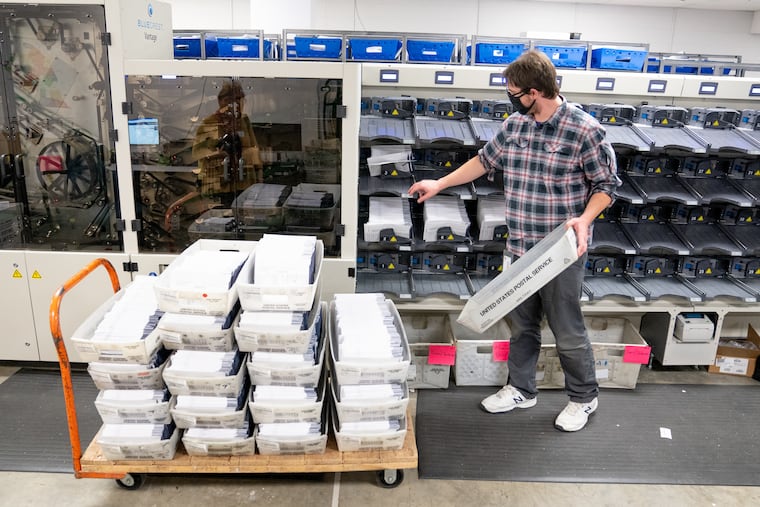Top Pa. lawmakers have tentative deal to ban private money, increase funding for county election offices
The exact language of the deal is still being written, and, if finalized, it would need approval from lawmakers in both chambers as well as Gov. Tom Wolf.

Spotlight PA is an independent, nonpartisan newsroom powered by The Philadelphia Inquirer in partnership with PennLive/The Patriot-News, TribLIVE/Pittsburgh Tribune-Review, and WITF Public Media. Sign up for our free newsletters.
HARRISBURG — Top Pennsylvania lawmakers have struck a tentative deal to get private money out of election administration.
The exact language is still being written, but the compromise, agreed to in principle in a private meeting Wednesday of the General Assembly’s top lawmakers on election policy, would increase state funding for county election offices, according to three sources with direct knowledge of the negotiations.
Such an increase would counteract the potential loss of private foundation funding, said the sources, who requested anonymity because they were not authorized to discuss the ongoing negotiations.
A total of 23 Pennsylvania counties received at least $16.5 million in funding from the Center for Tech and Civic Life, a nonprofit financed by Facebook founder Mark Zuckerberg, in the lead-up to the 2020 election, according to NPR.
The funding, much of which went to Democratic-leaning counties outside Philadelphia, helped them purchase equipment, pay staff, and administer early voting with mail-in ballots.
While local election officials celebrated the assistance as filling necessary funding gaps — particularly to implement the state’s newly passed mail-in voting law, Act 77 — Republicans have made eliminating it a top priority, arguing it creates an “appearance of corruption.”
“The Pennsylvania Constitution states that ‘elections shall be free and equal,’” state Sen. David Argall (R., Schuylkill) said in an April statement after a hearing on the grants. “Selectively funding elections in certain counties with private donations violates this clause and raises the specter of outside groups influencing election outcomes.”
Gov. Tom Wolf, a Democrat, has not been informed of the details of the proposed deal, state Sen. Sharif Street (D., Philadelphia) said Wednesday.
Street, the ranking Democrat on the Senate State Government Committee, met with his three counterparts — Argall, state Rep. Seth Grove (R., York), and state Rep. Scott Conklin (D., Centre) — Wednesday morning to discuss the plan for roughly 50 minutes.
He declined to discuss specifics of the bipartisan proposal but argued it would “make it easier and better for Pennsylvanians to vote.”
“We’ve all been working together for some time,” Street said. “And we just thought we’ve reached a moment where we’re hoping to get something done.”
Negotiations on the exact totals were still ongoing, the sources said. Two added that the ban may only be temporary, lasting a year and allowing lawmakers to revisit the policy — and additional funding — in 2023.
The proposal, if finalized, would also need to be presented to each individual caucus for approval before it could be passed and sent to Wolf’s desk. A ban was already included in the omnibus election bill Wolf vetoed at the end of budget talks last year.
A standalone bill banning counties from accepting outside funding passed the Senate in April by a veto-proof 37-12 margin. It is now in the House Appropriations Committee awaiting further action.
The deal does not address a number of issues that county elections officials have hoped to see resolved before the 2022 election, in particular giving counties time to open and count mail-in ballots before Election Day — also known as pre-canvassing.
WHILE YOU’RE HERE... If you learned something from this story, pay it forward and become a member of Spotlight PA so someone else can in the future at spotlightpa.org/donate. Spotlight PA is funded by foundations and readers like you who are committed to accountability journalism that gets results.